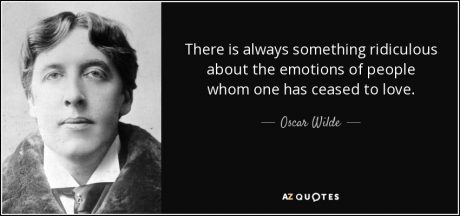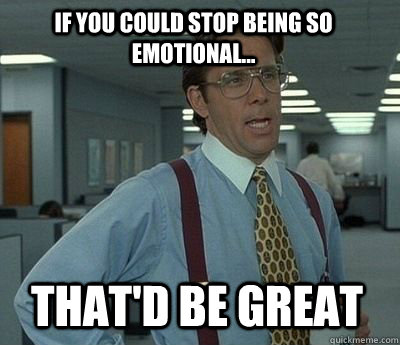One of the weirdest things from Filipinos is their transfixation on emotion, as I mentioned in my article about the raucous pursuit of highs. I remember when eating at a fast-food restaurant one time, I saw students doing a school project. One girl held up a paper-plate clock she made, and said “ang lungkot tingnan naman.” It seemed funny to me that Filipinos always have to associate an emotion with some ordinary objects. The Filipino seems to insist on getting an emotional experience out of everything. It led me to the conclusion that our culture teaches us to become “Feeling Junkies.” We tend to focus more on how something feels rather than on its practical benefits.
Filipinos still hold that obsolete belief that the heart, the seat of emotion, is always true. If a person shows a good enough emotional display, Filipinos are apt to find them credible. Never mind the facts that disprove the emotional display. Filipinos are so taken by these that they even refuse to think when the emotion appeals to them. It would be so ironic seem that Filipinos acknowledge the concept of Crocodile Tears, but forget about it later on.
| SUPPORT INDEPENDENT SOCIAL COMMENTARY! Subscribe to our Substack community GRP Insider to receive by email our in-depth free weekly newsletter. Opt into a paid subscription and you'll get premium insider briefs and insights from us. Subscribe to our Substack newsletter, GRP Insider! Learn more |
As I’ve said before, and as Zaxx recently did, solutions to Filipino problems involve dropping certain behaviors. One such behavior is this overrating of emotions. We need to be taught the right role of emotions, and must learn to control them.
The Deceitful Heart
One vital truth to teach is that the heart is deceitful.
Mass media helps spread this lie of the heart being always true. We watch movies and TV shows that reinforce this misconception. Countless shows use the line, “follow your heart,” “the heart is always right,” and others. These lines however would only be true for the fictional world of the show, and real-life experience has actually shown otherwise.
I remember a friend said he put “emotional investment” in many things, such as when he reads things on the Internet. As a result, he gets depressed. This is a habit that should be stopped. Instead of emotional investment, there is a need for emotional detachment.
Some people will say that you are cruel or inhuman to practice any form of emotional detachment. Filipino culture embraces this aggressively today. But this is wrong. Even if you emotionally detach yourself from certain things, you are not any less human than anyone. This kind of detachment is actually used so you can avoid more emotional damage from your experiences. If you let your experiences drain you through your emotional attachment, you will be sapped and be less able to deal with life.
One thing I find similar between people who commit suicide and Filipino culture in general: they depend too much on their emotions for happiness. That connection people make between happiness and emotions has proven to be a weak link. In making happiness dependent solely on emotions, one’s state of mind is more vulnerable to things that can pull their feelings down (repeating what I said before: the more you stop by to smell the roses, you might even pick up the animal poop smell). Happiness has an intellectual element to it. Happiness is not a feeling. It’s a cognitive process that involves a lot more than mere feeling. I’ll dare say that feelings are not an essential part of true happiness.
Another idea that I would challenge is the idea that emotions make us human. This is because animals and plants are also able to manifest emotions and can feel things like pleasure, sorrow, empathy and more. What really sets humans apart is the ability to think. We are capable of making vast constructions, written works and civilizations; animals are not. While we should not totally block away emotion, it is our cognitive abilities that allow us to examine our emotions, take stock of situations and make vital decisions. Thinking should be seen as a natural process of the human creature, not as an aberration. It is more an aberration for people to not think. It is this nature that people need to fine-tune and develop for contributing to a better world.
Going Emo over Outrage Fads and All
We’ve seen many people do emotional outbursts over Ferdinand Marcos’ burial at the Libingan ng mga Bayani. Sure, you can feel indignant at it. But the emotional outbursts would be needless. Why, you ask? You may insist that emotional outbursts make us “human?” Well, simply, they are a waste of time. You can go shout your lungs out, but in the end, you drain yourself. Also, what do emotional outbursts accomplish? Feel good, or just a show for everyone to see? In a way, it’s like shooting oneself in the foot.
Feeling indignation does not necessarily mean you are right. You could be wrongly Indignant at something. For example, one guy feels indignant that a girl loved some other guy. Then the guy poisons that other guy, or tries to kill him some way. Then it turns out he killed the wrong guy. That’s what feelings, when unbridled and “obeyed,” leads to. The heart is indeed deceitful.
That’s why GRP has a lot of articles that frown on the “emo” (as in, emotional) reactions of people. Without proper thinking to guide it, emotional reaction tends to lack common sense. Feelings make you try to disregard truth and pursue the wrong goals in order to reach that “good feeling.” The proper thinking involves not submitting to what someone feels and questioning those feelings, while trying to learn more to better solve the problem rather than make a hasty decision.
Focusing on feeling also like makes Filipinos overrate apparent falsehoods and vicarious experiences. For example, remember that couple who posted pictures claiming to be in another country, when in fact they were just near Nuvali in Metro Manila? In order to feel good showing off, they posted a lie.
There’s the rub with emotionalism. When you become seized by your emotions, you are more likely to become unreasonable. The more unreasonable you become, the greater your tendency to do wrong. You may feel that you are entitled to your happiness, and you want other people to give it to you. If they don’t, you scream and cry and say those people are unfair to or are oppressing you. In fact, you are harassing them just for your own selfish motives.
Pure emotion also plays a role in making us hate more easily (and become hate junkies). I’ve encountered someone who finds it offensive that other people are not bothered with Donald Trump as U.S. president. I returned with the advice that you can’t condemn people who have different feelings from yours. A person who is not willing to accept that people can have different emotions and ideas from her over the same object does not seem to respect another person’s freedom. When someone feels they have the monopoly over what is right, it usually leads to them wanting to force others to agree with their views. It makes them hate other people more easily, and fall more quickly to bigotry, hate-mongering and violence against others. It is also egocentrism in action.
Ending the Era of ‘Good Feelings’
Some make observations that the current young generation is soft and wimpy. I’d say there have been such people in any generation, and a trait that is common in all those is belief in entitlement to their “good feelings.” It could be considered the same “think positive” and “we deserve happiness” baloney that we’ve been deconstructing in other articles in this blog. This era defined by postmodernism and bobos (Bohemian Bourgeoisie), as well as the commercialism that has taken advantage of these, has led to so many people becoming easily “offended,” becoming control-freaks and unnecessarily enraged against those they believe are obstacles to their “good feelings.” This is part of the political correctness that has dulled minds and blurred much of our common sense on issues.
Filipinos should stop pursuing “good feelings.” We are not entitled to them. Letting emotions control us makes us act aimlessly and nonsensically, as I quoted from Malcolm Gladwell’s explanation of temporary autism in Blink. And, as I reiterate, there are such things as wrong emotions.
Emotions are not the end. They are not things we must satisfy. They are a means to an end. My view of the purpose of feelings is that they guide us as we go through life. They help tell us judge whether something is a threat or not by its impact on us, similar to pleasure and pain on the physical side. But emotions must never be used alone. They go hand-in-hand with our intellect. The moment we strike the right balance between the three major parts, the head, heart and hand (intellect, emotions and action), we will be able to deal with life and with issues in a better way.
And as I said in my article about article about highs, our feelings are mostly the result of chemicals in our brain. We can feel happy, sad, depressed or ecstatic based on the results of hormones and substances like dopamine, serotonin and norepinephrine. These chemicals don’t need to be induced by drugs or other substances; a large part of their function depends on our cognitive processes. This perspective tells us that we have the power to put our emotions in check and ensure that we don’t commit the big mistakes in life.
I believe, as my cohorts here do, that what Filipinos embrace as their culture is what actually pulls the country down. And those who seem to be anti-dictators, who may also believe themselves to be “heroes,” are the real dictators.



“The heart has reasons, that reasons cannot understand”, from the French Philosopher, Jean Jacques Rousseau.
Rousseau’s philosophies influenced the Age of Enlightenment in France and Europe. He was a member of the Jacobin Club in the French Revolution.
While we Filipinos, cling to our emotions, to make us : happy, sad, sorry, or depressed. It is our way of shielding our painful struggles in life. Reason is rarely used by Filipinos. Some has no common sense…even our leaders…
A few of us, can understand the function of the brain’s neurotransmitters, that affect our emotions.
The Amygdala in the brain, is the center of emotion…and the Pre Frontal Cortex affects, how we see things and our cognition.
Well, we don’t go too deep in this level… However, we are already in the Age of Artificial Intelligence.
Robotic Machines, can learn and teach each other. And these Artificial Intelligence machines can think , learn , and act like humans.
Emotion is needed, to make us humans, not machines. Emotion produce: kindness, altruism, sympathy, empathy, goodness, etc..
On the other hand, if we use emotion in deciding important things in life…it is a mistake for us. Reason must be used in decisions. We must have “common sense” to decide what is right or wrong !
Our brain is there, to make us think…the heart is not the brain !
Yay – a ChinoF article. About time too.
>> Another idea that I would challenge is the idea that emotions make us human. This is because animals and plants are also able to manifest emotions and can feel things like pleasure, sorrow, empathy and more. What really sets humans apart is the ability to think.
Perhaps this explains the Filipino attitude to the rest of God’s creation, ie,., indifference to animal suffering or outright cruelty.
This is not a peculiarly Filipino thing – there have been Western philosophers (usually those without any education in neuroanatomy or comparative biology) who assert the same thing. It’s a strong thread in Catholic tradition that only humans have souls. Whereever it comes from, it’s a vile idea that deserves to die in a ditch.
Anyway, I agree that the fundamental problem here is a refusal to think. While Westerners might not be much better at it, thinking is at least a centuries-old tradition. It’s a skill, and it’s taught in schools. Filipinos, on the other hand, are told NOT to think in school. Just remember the facts and don’t question them, even if they’re not facts. Cheat and lie on your tests if you want to. It’s all good as long as nobody catches you.
As I’ve said before, I think Filipinos would be a whole lot better off if they refused to accept the dubious product sold to them as ‘education’. Like most things in this country, ‘education’ here is just a facade with no substance behind it.
“What’s right or wrong, it’s no more than a person’s feelings.”
-Enma Ai from anime series Hell Girl
The emo junkie ignites his/her feelings with ugly things/events/opinions, and the emotions that were meant to last for a lifetime burn away in full force in a couple of short years.
The problem boils down to the fact that Filipinos are not taught how to think correctly from a very young age. Filipino children learn most by emulating the patterns of behavior they see in parents, teachers and TV personalities, who often showcase an emotion-driven decision making process.
Then there’s the subliminal programming that comes with listening to Charice’s 「Louder」 song…
Let my heart speak louder than my head
Filipinos who wish to think correctly rather than emotionally can start from the fundamentals…
zaxxun.com/fundamentals-of-logic-if-then
zaxx: it’s funny you should mention “if then” logic. It took me quite a while to realize that most Filipinos simply do not understand the basics of propositional logic. As for the more complex forms of logical deduction … forget it. I had always assumed such things were more-or-less innate, and it was only after reflecting for some time on my upbringing and schooling that I realised that it isn’t: it has to be taught.
If people are taught to reason incorrectly, then they will spend the rest of their lives rationalizing in incorrect ways and believing all sorts of random nonsense because nobody ever gave them the mental tools to think their way out of it. What foreigners perceive as stupidity – such as being unable to follow “IF I do this THEN that will happen” – is probably just the result of Filipino culture never having independently developed a system of formal logic, and (worse) rejecting the Western system on the basis that Filipino didn’t invent it.
Marius: Its the sad Oxymoronic reality of the scarcity of common sense in the Philippines, and instead the oversupply of morons – even in high places of government. Filipinos are taught Philosophy (logic) too late in the ballgame (College). Then they fail to even grasp its relevance in practical daily living.
Another area of improvement needed is in financial literacy. Pinoys spend based on emotions rather than on logic. Many fall victim to Impulsive buying. Borrowing from a sermon I once heard: Filipinos need to save/share what is right, not what is left.
Let’s hope someone from DECS is listening. Then probably they’ll fix the K-12 curriculum and replace some of the garbage (heroism of Ninoy) with matters of greater relevance.
But even if logic and the dangers of over emotionalism are taught early in schools, the big question is on whether Pinoys will even have the good sense to apply them.
Marius, late reply, but I’m flattered you anticipate my articles. Thanks, and I try to squeeze this blog thing in when I can. I just have a Word file of articles to polish before publishing. I plucked this one because the current brouhaha about Trillanes and the Duterte son elicits the usual emotional rather than thinking responses from others. It sure is quite the challenge to convince Filipinos to think.
Wow, interesting Charice (or is it Jake Z, hehe) song you brought up, Zaxx. Proves that mass media is helping us suppress thinking and letting emotions get out of hand.
Jake, I would differ from Enma in that. Thinking is as much a part of good and evil as emotion. She could haunt me if she wants for my disagreement. hehe
I am married to a Filipina and I find myself consistently dealing with strong emotions.
One of the things that contribute to this highly charged emotionalism is probably the fact that my wife, as well as most Filipinos whom I know start out their days already in reaction. They get up and they immediately check their notifications, listen to music, watch a video on Youtube instead of taking a little time to meditate or write in a journal.
How they start their days affect how the entire day plays out. They start in reaction and begin accumulating emotional toxicity as soon as they open their eyes and, usually they have no outlet for all this toxicity as very few work out or meditate.
As you said in your previous article Filipinos always want to be on a high either using an electronic gadget or snacking on some junk food. I observe this behaviour in my Filipino wife and her Pinoy friends and relatives every single day and there is little wonder if they accumulate so much hinanakit or other strong emotions.
Thanks for your article